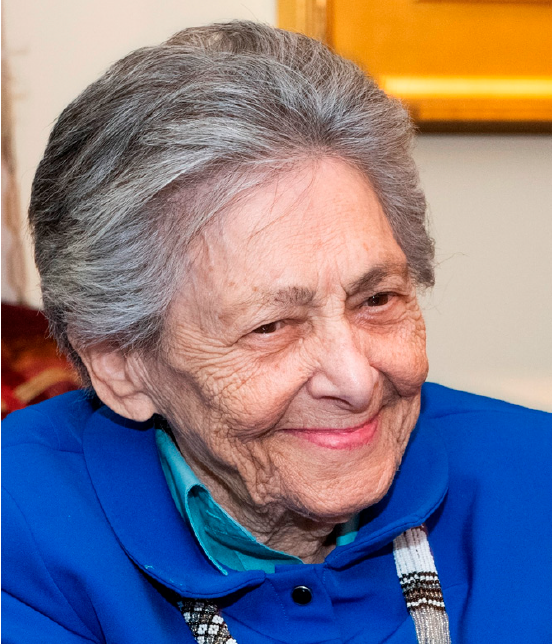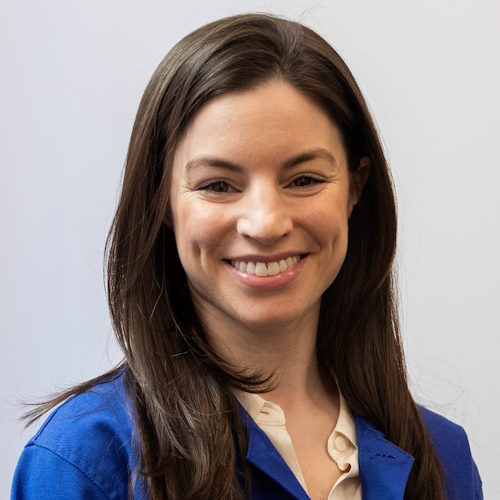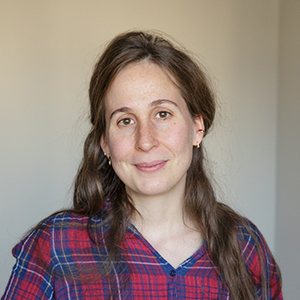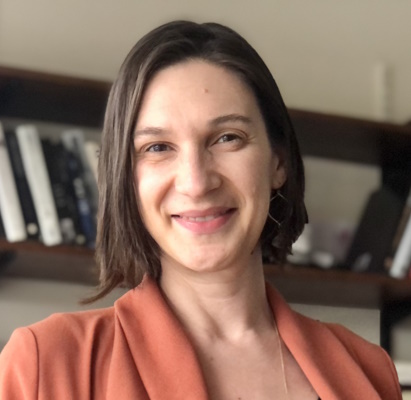Lila R. Gleitman Prize

The Cognitive Science Society is pleased to announce the Lila R. Gleitman Prize for Early-Career Contributions to Cognitive Science in honor of Lila R. Gleitman’s foundational role in the field of cognitive science. The recipient will be an early-career woman in cognitive science whose outstanding research and scholarly promise best represent the intellectual depth, ingenuity and significance of the work carried out by Lila R. Gleitman throughout her long scientific career. The prize is jointly directed by the Cognitive Science Society Governing Board and the leadership of the Society for Language Development which Gleitman founded and led for many years.
The recipient of the prize will be honored at the Cognitive Science Society’s Annual Meeting in a ceremony in which a framed certificate and a monetary award of $35,000 will be presented. In addition, the recipient will be invited to give a talk on her work during one of the regular sessions of the Annual Meeting.
Lila R. Gleitman, a winner of the David E. Rumelhart Prize for her contributions to the theoretical foundations of human cognition, passed away on August 8, 2021. Gleitman was Professor Emerita of Psychology and Linguistics at the University of Pennsylvania, and a pioneering figure in the field of modern cognitive science.
In a career that spanned six decades, Gleitman made numerous foundational discoveries in the study of language and cognition. She is particularly known for her research on how children acquire language, how language and thought are related, and the role of syntax in shaping the direction of word learning.
Gleitman was widely recognized for her influential research: She was a member of the National Academy of Sciences and an elected fellow of the American Psychological Association, the Association for Psychological Science, the Society of Experimental Psychologists, the American Association for the Advancement of Science, and the American Academy of Arts and Sciences. She served as President of the Society for Language Development, the Society for Philosophy and Psychology, and the Linguistic Society of America.
Gleitman was a legendary mentor who trained a long and distinguished list of psycholinguists, many of whom went on to become central figures in the field. In 1991, Gleitman co-founded the famous Institute for Research in Cognitive Science at Penn, which she co-directed until 2001. Under her leadership, the Institute became a model for promoting interactions between psychology, linguistics, computer science, philosophy, neuroscience and other branches of inquiry that contribute to the computational study of the mind.
Read more about Dr. Gleitman:
https://www.nytimes.com/2021/08/27/science/lila-gleitman-dead.html
https://cognitivesciencesociety.org/remembering-lila-gleitman/
Selection Committee
The Gleitman Prize is administered by the Prize Selection Committee. Screening of nominees and selection of the prize winner will be performed by the Prize Selection Committee. Scientific members (including the Chair) of the Prize Selection Committee will serve for up to two four-year terms. Selection of the prize recipients will strive to achieve disciplinary balance and diversity (within the eligible pool) broadly construed, and recognize professional integrity.
Committee members (2025):
Marlene Behrmann, University of Pittsburgh and Carnegie Mellon University
Cynthia Fisher, University of Illinois
Ulrike Hahn, Birkbeck University of London
Barbara Landau, Johns Hopkins University
Anna Papafragou (Committee Chair), University of Pennsylvania
Donation to the Gleitman Prize Endowment
A special fund for the Gleitman Prize has been created through contributions in Gleitman’s honor by her family, students, colleagues, and other members of the field. We invite anyone who wishes to recognize Lila R. Gleitman and her pioneering role in cognitive science to donate to the Lila R. Gleitman prize endowment fund. Such donations will enable the Society to recognize Gleitman’s legendary life in science long into the future.
If you would like to donate by check or another mechanism, or if you have any questions, please contact Stephanie Denison, Executive Officer at .
Tax efficient giving The Cognitive Science Society is a registered 501(c)(3) tax-exempt organization under the Internal Revenue Code, so US donors can qualify for an income tax deduction to the limits allowed by law. It also is possible to give tax efficiently through Transnational Giving Europe from the following European countries: Belgium, Bulgaria, France, Germany, Hungary, Italy, Luxembourg, Poland, Republic of Ireland, Switzerland, and The Netherlands. To donate and claim tax relief please contact your national foundations and explain that you wish to make a gift to the Cognitive Science Society.
2025 Recipient - Moira Dillon
 Moira (Molly) Dillon is the recipient of the 2025 Lila R. Gleitman Prize. Dr. Dillon is an Assistant Professor of Psychology at New York University. She received her Ph.D. in Psychology at Harvard University in 2017, following a B.A. in Cognitive Science at Yale University.
Moira (Molly) Dillon is the recipient of the 2025 Lila R. Gleitman Prize. Dr. Dillon is an Assistant Professor of Psychology at New York University. She received her Ph.D. in Psychology at Harvard University in 2017, following a B.A. in Cognitive Science at Yale University.
Dr. Dillon’s research focuses on human understanding of the abstract concepts of Euclidean geometry, especially whether these concepts form a single unitary system, a ‘language of thought’ of geometry. To address this question, she has examined how aspects of geometry develop from infancy to adulthood, and how geometric principles manifest themselves within different representational domains and task requirements (e.g., object representation, navigation and scene perception, map reading, word learning). Her findings have challenged the ‘language of thought’ thesis for geometry by showing that infants are sensitive to only some foundational properties of Euclidean geometry (e.g. length relations for 2D planar figures) but not others (e.g. angular relations); and by arguing that what might appear to be a unified geometric system in adults is actually the product of two independent systems (i.e. navigation vs. object recognition) which appear early in development but are combined over development, possibly through the use of language, a uniquely human capacity. The early presence of the two systems results in quite different sensitivities to geometric properties depending on the cognitive domains in which they are applied. Dr. Dillon’s work also probes the effects that this separation of geometric domains has on word learning, showing that generalizations of the meaning of a new word will vary depending on the domain that it engages, and on children’s representations of layouts in drawings, which show strong tendencies to focus on objects rather than scenes.
Dr. Dillon’s work forges new territory in foundational questions about human cognition, its development, and its unique status among species. She has explored these questions using classical experimental behavioral approaches among infants, children, and adults, as well as approaches that have allowed her to explore important applications of her findings. In one such line of research, she played a lead role in large-scale field experiments in India, creating intuitive game-like educational interventions aimed at enhancing mathematical understanding in large groups of school children. The intervention affected aspects of intuitive mathematics, but did not extend to formal mathematics, suggesting the need for different kinds of interventions to improve the latter. Dr. Dillon has also collaborated with computer scientists to determine the extent to which artificial intelligence systems might capture the deep understandings of objects, space, and social principles as shown by infants and by inference, how human intelligence differs from artificial intelligence.
In sum, Dr. Dillon’s work breaks new ground in our understanding of human cognition. It is highly creative, reflecting wholly new ways of capturing human knowledge of geometry in infancy and its development through adulthood. Her work exemplifies the essence of Lila R. Gleitman and her foundational role in cognitive science, representing intellectual depth, ingenuity, and significance of the work carried out by Gleitman throughout her long scientific career. We are delighted to see Moira Dillon continue this legacy by becoming the 2025 winner of the Lila R. Gleitman Prize.
Key selected publications:
Lin, Y. & Dillon, M. R. (2023). We Are Wanderers: Abstract geometry reflects spatial navigation. Journal of Experimental Psychology: General, 153, 386–398.
Stojnić, G., Gandhi, K., Yasuda, S., Lake, B. M., & Dillon, M. R. (2023). Commonsense psychology in human infants and machines. Cognition, 235, 105406.
Hart, Y., Mahadevan, L. & Dillon, M. R. (2022). Euclid’s Random Walk: Developmental changes in the use of simulation for geometric reasoning. Cognitive Science, 46, e13070.
Dillon, M. R. (2021). Rooms without Walls: Young children draw objects but not layouts. Journal of Experimental Psychology: General, 150(6) 1071–1080.
Dillon, M. R., Kannan, H., Dean, J. T., Spelke, E. S. & Duflo, E. (2017). Cognitive Science in the Field: A preschool intervention durably enhances intuitive but not formal mathematics. Science, 357(6346), 47–55.
2024 Recipient - Isabelle Dautriche
 Isabelle Dautriche is the recipient of the 2024 Lila R. Gleitman Prize. Dautriche is a Junior Researcher at the Centre de Recherche en Psychologie et en Neurosciences (CNRS) in Aix-Marselle University, France. She received her Ph.D. in Cognitive Sciences at the University Paris V, France, following a degree in Engineering (Mathematics and Modeling) at the National Institute of Applied Sciences, Toulouse, France.
Isabelle Dautriche is the recipient of the 2024 Lila R. Gleitman Prize. Dautriche is a Junior Researcher at the Centre de Recherche en Psychologie et en Neurosciences (CNRS) in Aix-Marselle University, France. She received her Ph.D. in Cognitive Sciences at the University Paris V, France, following a degree in Engineering (Mathematics and Modeling) at the National Institute of Applied Sciences, Toulouse, France.
In the first decade of her career, Dautriche has made a range of theoretically important, highly original, and rigorous contributions to cognitive science, focusing on language acquisition, language processing, and their intersection with issues core to understanding language more generally. She has used multiple methods to address these topics, including experimental behavioral work with infants, adults, and other species, as well as state-of-the-art techniques in machine learning, information theory, statistics, and corpus mining. She has used these methods to answer deep questions about how human minds are structured to support language learning, especially aspects of the lexicon, how biases in learning shape the nature of the lexicon in natural languages, and how other species differ from (or are similar to) humans in the patterns they recognize and their capacity for one signature of human language– compositionality. In pursuing these issues, Dautriche has probed the problem of how we learn different meanings for homophones (e.g., bat, bank), finding that even the youngest learners recruit a variety of types of linguistic information, including syntax, to differentiate two same-sounding forms as having two different meanings. She has also examined how languages cope with opposing tendencies for wordforms, either maximizing distinct wordforms (to avoid perceptual confusability), or favoring phonological regularity (which would support learning, remembering, and production). Across languages, she has found that languages tend towards the latter, suggesting that processes of learning and memory play an important role in how the lexicons of languages evolve. She has developed new methods to gain insight into previously unstudied aspects of infants’ and toddlers’ word learning, showing that they exhibit a type of metalinguistic understanding of their own knowledge, which is reflected in their varying levels of confidence during word learning trials. And she has probed for the existence of compositionality in non-human primates, asking whether baboons (like humans) can represent negation and use it in combination with other properties, shedding light on the evolutionary foundations of language.
Dautriche’s work has been intensely collaborative with scientists spanning multiple areas of expertise and seniority, bringing to her work the best of others to enhance the depth and breadth of her research program. She has also made significant contributions to the teaching of mathematics and developmental linguistics by creating hundreds of instructional videos for the French Khan Academy, and has significantly contributed to the development of the scientific communities to which she has belonged.
Dautriche exemplifies the essence of Lila R. Gleitman and her foundational role in cognitive science, representing the intellectual depth, ingenuity, and significance of the work carried out by Gleitman throughout her long scientific career. We are delighted to see Isabelle Dautriche continue this legacy by becoming the 2024 winner of the Lila R. Gleitman Prize.
Key selected publications:
Dautriche, I., Buccola, B., Berthet, M., Fagot, J., & Chemla, E. (2022). Evidence for compositionality in baboons (Papio papio) through the test case of negation. Scientific Reports, 12(1), 19181.
Dautriche, I., Goupil, L., Smith, K., & Rabagliati, H. (2022). Two-year-olds’ eye movements reflect confidence in their understanding of words. Psychological Science, 33(11), 1842-1856.
Dautriche, I., Fibla, L., Fievet, A. C., & Christophe, A. (2018). Learning homophones in context: Easy cases are favored in the lexicon of natural languages. Cognitive psychology, 104, 83-105.
Dautriche, I., Mahowald, K., Gibson, E., Christophe, A., & Piantadosi, S. T. (2017). Words cluster phonetically beyond phonotactic regularities. Cognition, 163, 128-145.
Dautriche, I., Swingley, D., & Christophe, A. (2015). Learning novel phonological neighbors: Syntactic category matters. Cognition, 143, 77-86.
2023 Recipient - Talia Konkle
 Talia Konkle is the recipient of the Inaugural Lila R. Gleitman Prize (2023). In the first decade of her career, Konkle has made a range of theoretically important, highly original, and rigorous contributions to cognitive science and cognitive neuroscience in our understanding of how the visual system computes representations of objects. She has used behavioral, neural, and computational modelling methods to converge on answers to the question of how the mind perceives objects and how the brain computes the representations that lead to those perceptions. Examining the mappings of neural responses across the cortex, she has gained insight into the brain’s cognitive architecture, and has developed computational theories that help explain how and why the mind is organized the way it is. Her work has been characterized as embodying the creativity of an artist, the analytic rigor of a scientist, and the technical skill of an engineer. Konkle has shown deep and active commitment to creating and openly sharing her science and research tools with the vision science community. She is also known as a gifted communicator and a devoted mentor to younger scholars.
Talia Konkle is the recipient of the Inaugural Lila R. Gleitman Prize (2023). In the first decade of her career, Konkle has made a range of theoretically important, highly original, and rigorous contributions to cognitive science and cognitive neuroscience in our understanding of how the visual system computes representations of objects. She has used behavioral, neural, and computational modelling methods to converge on answers to the question of how the mind perceives objects and how the brain computes the representations that lead to those perceptions. Examining the mappings of neural responses across the cortex, she has gained insight into the brain’s cognitive architecture, and has developed computational theories that help explain how and why the mind is organized the way it is. Her work has been characterized as embodying the creativity of an artist, the analytic rigor of a scientist, and the technical skill of an engineer. Konkle has shown deep and active commitment to creating and openly sharing her science and research tools with the vision science community. She is also known as a gifted communicator and a devoted mentor to younger scholars.